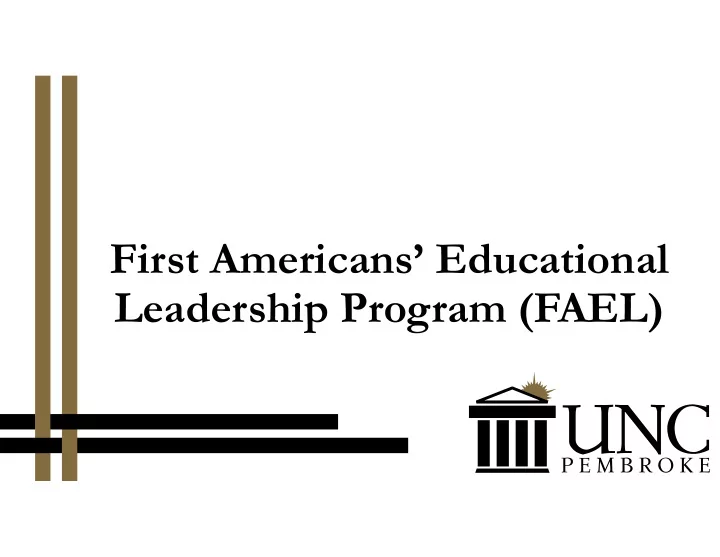

First Americans’ Educational Leadership Program (FAEL)
Need for Project • In NC, the principal turnover (attrition) rate is 9% with 43% of principals having less than three years of experience (NC Report Card, 2018). Percentage of • Robeson, Hoke, and Scotland counties receive Low Percentage Percentage American Indian Wealth Supplemental funding and are classified by the Total of American of American Administrators School Student Indian Indian (includes AP’s & NC Department of Commerce (NCDC) as Tier 1, at District Population Students Teachers Principals) the highest level of economic need. • Financial Barriers for students to pursue higher Hoke County education Schools 8,250 10% 4% 10.70% Public Schools of Robeson • The PSRC Title VI Indian Education Program serves County 24,000 48% 28% 41% approximately 11,300 American Indian students in Scotland grades K-12, which makes it one of the largest Title County VI programs in the United States (Public Schools of Schools 5,953 16% 5% 6% Robeson County, n.d.).
• Although there is mostly minority students in the educational system today, there continues to be a gap in student-teacher, teacher-administrator diversity ( Hrabowski & Sanders, 2015 ). • Research suggest that hiring minority principals can improve stability across the school because teachers are more likely to stay at a school where the majority of ethnic backgrounds are similar to their own ( Gates et al, 2006 ). • Students who see their culture in the teacher see them as more accessible and caring and their instructional practices as more engaging Administrators can improve the quality of a student’s educational experience through the creation of positive learning environments.
Purpose of the FAEL Program • Address the shortage of Al administrators in public school districts that have a significant AI student population by providing financial support to participants to obtain a school administration degree. • Provide on-going professional development, mentoring support and induction services to participants that allows them to work in high needs schools to improve educational outcomes for AI students.
GOAL 1: Increase the number of highly qualified American Indian administrators in Robeson County and surrounding counties through enrollment in the FAEL Program, graduation of the Master of School Administration or completion of School Administration Add-on program, and Program completion of state (NC) licensure requirements. Goals GOAL 2: Provide mentoring support for pre-service administrators engaged in Transformative School Leadership Academy and provide job placement assistance to ensure high-quality school leadership from the very first day as an administrator. GOAL 3: Improve the first two years administrative experience of newly licensed American Indian administrators through a comprehensive mentoring and induction plan.
Eligibility Criteria • American Indian student enrolled at UNCP in the School Administration or School Administration Add-on (State or federally-recognized tribal members) • Degree, licensure and employment as an administrator must be attained by August 2021 • Service payback required (service payback equivalent to the length of time trained) • Service payback must be in an area related to the degree and licensure • Cash payback required in the absence of service payback (cash payback for the cost of training) • Leadership experience and desire to serve as an administrator.
Benefits • Tuition and fees (MSA Graduate Program), Books • Partial childcare costs • Employment Stipend (for full-time students and working less than 20 hours per week) • Partial education supplies • Membership in a Professional Organization • Monthly Professional development seminars • Select leadership conference registration and support • Laptop computer • Professional networking opportunities • Induction/mentoring/consultation support • Mentors will receive $100 per month per mentor (pre- service) and $500 summer stipend
Pre-Service and In-Service Training Professional Development Sessions • Culturally Responsive Leadership • STEM education and the STEM Community Engagement Process • Transformative Leadership • Assessment literacy/data analysis and reporting Attendance at Select Professional Conferences • Closing the STEM GAP • Model Schools Conference • Connecting Communities, Educators, and Stakeholders Conference • NC PAPA Conference • Southeast American Indian Studies Conference • MSA Leadership Seminar • NC Indian Unity Conference “Our Indigenous worldview is as equally important as the non-Native Attendance at Cultural Events at UNCP and within worldview; thus, the theory of new ways of teaching and learning has the community (2 per semester) the potential to enrich the history, heritage, and culture of Indigenous communities.” Dr. Tiffany Locklear
• Summer 2019 (5-Days) – Participants and Mentors – Daily Stipend provided • Allow participants • to dive deeper into a framework for culturally responsive system design on improvement science and the steps necessary to lead innovation and short-cycle continuous improvement The Transformative School Leaders’ Academy
• Continuous knowledge and support from pre-service preparation to in-service training through induction from active and retired administrators with proven success in working in low-performing • Opportunities to development learning networks through a cohort structure • Effective leadership development and learning that links theory to practice with supervision and instructional leadership, data analysis that enhances the administrator’s ability to improve teacher effectiveness, Induction Services school climate, and school culture as well as building community relationships. (2-Years)
Application Process • Admission to UNCP MSA Program • Completion of online application and Essay • Three recommendations completed online from a current/former principal supervisor and/or Online Application for Participants administrative supervisor and an SOE/MSA faculty member Recommendation Form • Personal interview with the Project Director
Recommend
More recommend